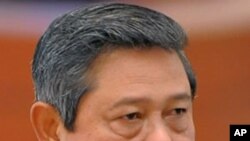Indonesian President Susilo Bambang Yudhoyono has ordered police to hunt down and arrest assailants who attacked Christians heading to a religious service. Some advocates for pluralism here say the president has until now done little to prevent religious intolerance at home, although he urged President Obama to prevent a Christian group from burning Qurans in America.
For months relations between members of the Batak Christian Protestant Church and Islamic fundamentalist groups in the Jakarta suburb of Bekasi have been tense. Although the local government denied them permission to build a church on an empty lot they own, church leaders have held religious services on the property.
Some Muslim groups have responded with weekly demonstrations intended to disrupt the services.
Bekasi police chief Imam Sugianto says 500 hundred officers have been assigned to prevent violence at the services. However, on Sunday assailants on motorbikes attacked a procession of Christians on the way to worship.
Sugianto says suddenly the assailants cut into the procession and they blocked the way. Then they started stabbing one person and hitting the pastor.
Sugianto says police quickly came to the aid of the two victims, and that neither sustained life-threatening injuries. While the assailants got away, he said, they have been identified and he expects they will be apprehended soon.
President Susilo Bambang Yudhoyono called on authorities to investigate and to hold accountable those responsible. The president, who relies heavily on Islamic parties for political support, had been criticized in the media for failing to crack down on Muslim hard-liners in the past.
However, he publicly urged President Obama to prevent a Christian group from burning Qurans in America. In the end, the pastor who threatened to burn the Qurans canceled the event.
Damien Dematra, with the group Pluralism Care Movement, says the assailants might have been fundamentalist Muslims motivated in part by anger over the Quran burning controversy.
"This never happened before. I mean, there have been some demonstrations before in Bekasi, but there has never been any stabbing or similar to that, right? This is for the first time," Dematra says, "so I suspect that some interest is trying to play in this situation. They try to take advantage."
Indonesia is a secular country of 237 million people and has more Muslims than any other in the world. Though it has a history of religious tolerance, an extremist Muslim fringe has become more vocal in recent years. And by law religious practices can be restricted. For instance, Christians can not build a church if anyone in the district objects, and some Muslim groups have made a point of blocking new churches.
Dematra says while the president has been slow to speak out on the complicated issues that divide the Christians and Muslims in Bekasi, he has taken a strong stand against the use of violence to solve political problems.
Mr. Yudhoyono has in the past few months spoken in general terms about the need for tolerance. Until Sunday's attack, he had indicated he considered the religious protests in Bekasi to be a local matter left to officials in the community.
Indonesian President Orders Police to Arrest Those Who Attacked Christian Group




